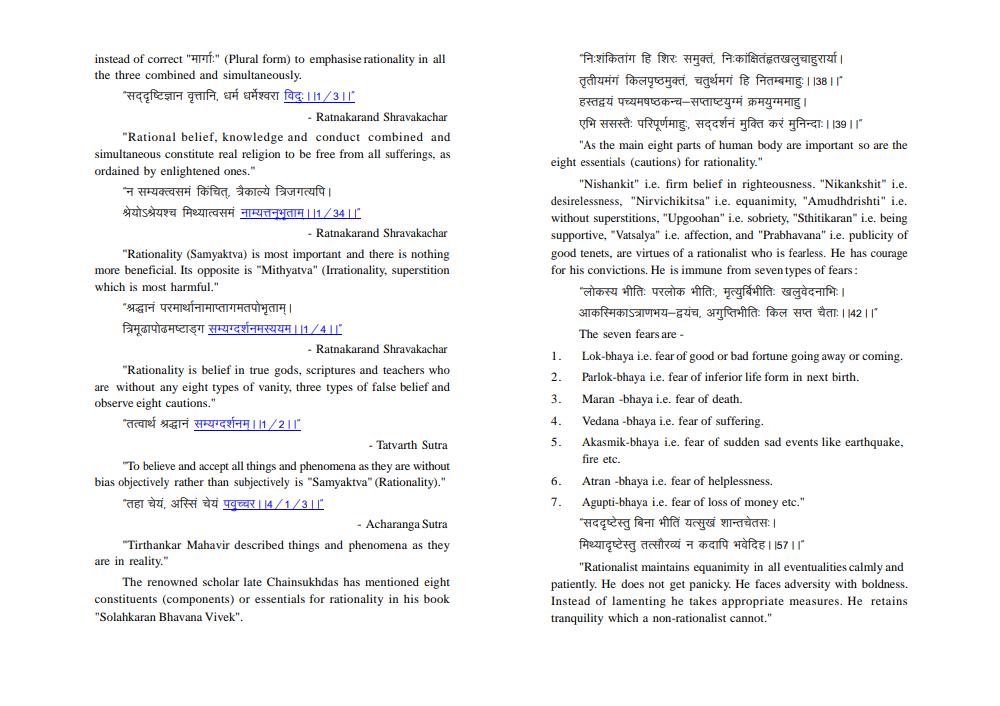________________
instead of correct "मार्गाः" (Plural form) to emphasise rationality in all the three combined and simultaneously. सदृष्टिज्ञान वृत्तानि, धर्म धर्मेश्वरा विदुः । 11/3।।
- Ratnakarand Shravakachar "Rational belief, knowledge and conduct combined and simultaneous constitute real religion to be free from all sufferings, as ordained by enlightened ones."
न सम्यक्त्वसमं किंचित्, त्रैकाल्ये त्रिजगत्यपि। श्रेयोऽश्रेयश्च मिथ्यात्वसमं नाम्यत्तनभताम |11/341
- Ratnakarand Shravakachar "Rationality (Samyaktva) is most important and there is nothing more beneficial. Its opposite is "Mithyatva" (Irrationality, superstition which is most harmful."
"श्रद्धानं परमार्थानामाप्तागमतपोभृताम् । त्रिमूढापोढमष्टाङ्ग सम्यग्दर्शनमस्ययम।।1/4||"
- Ratnakarand Shravakachar "Rationality is belief in true gods, scriptures and teachers who are without any eight types of vanity, three types of false belief and observe eight cautions." "तत्वार्थ श्रद्धानं सम्यग्दर्शनम्।।1/2||"
- Tatvarth Sutra "To believe and accept all things and phenomena as they are without bias objectively rather than subjectively is "Samyaktva" (Rationality)." "तहा चेयं, अस्सिं चेयं पच्चर।।4/1/31
- Acharanga Sutra "Tirthankar Mahavir described things and phenomena as they are in reality."
The renowned scholar late Chainsukhdas has mentioned eight constituents (components) or essentials for rationality in his book "Solahkaran Bhavana Vivek".
'निःशंकितांग हि शिरः समुक्तं, निःकांक्षितंहृतखलुचाहुरार्या । तृतीयमंग किलपृष्ठमुक्तं, चतुर्थमगं हि नितम्बमाहुः ।।38 Ir हस्तद्वयं पच्यमषष्ठकन्च-सप्ताष्टयुग्मं क्रमयुग्ममाहु । एभि ससस्तैः परिपूर्णमाहुः, सद्दर्शनं मुक्ति कर मुनिन्दाः ।।391
"As the main eight parts of human body are important so are the eight essentials (cautions) for rationality."
"Nishankit" i.e. firm belief in righteousness. "Nikankshit" i.e. desirelessness, "Nirvichikitsa" i.e. equanimity, "Amudhdrishti" i.e. without superstitions, "Upgoohan" i.e. sobriety, "Sthitikaran" i.e. being supportive, "Vatsalya" i.e. affection, and "Prabhavana" i.e. publicity of good tenets, are virtues of a rationalist who is fearless. He has courage for his convictions. He is immune from seven types of fears:
"लोकस्य भीतिः परलोक भीतिः, मृत्युर्बिभीतिः खलुवेदनाभिः । आकस्मिकाऽत्राणभय-द्वयंच, अगुप्तिभीतिः किल सप्त चैताः । 142 ।।'
The seven fears are - 1. Lok-bhaya i.e. fear of good or bad fortune going away or coming. 2. Parlok-bhaya i.e. fear of inferior life form in next birth. 3. Maran -bhaya i.e. fear of death.
Vedana-bhaya i.e. fear of suffering. Akasmik-bhaya i.e. fear of sudden sad events like earthquake, fire etc. Atran -bhaya i.e. fear of helplessness. Agupti-bhaya i.e. fear of loss of money etc." सददृष्टेस्तु बिना भीतिं यत्सुखं शान्तचेतसः । मिथ्यादृष्टेस्तु तत्सौरव्यं न कदापि भवेदिह। 1571
"Rationalist maintains equanimity in all eventualities calmly and patiently. He does not get panicky. He faces adversity with boldness. Instead of lamenting he takes appropriate measures. He retains tranquility which a non-rationalist cannot."




